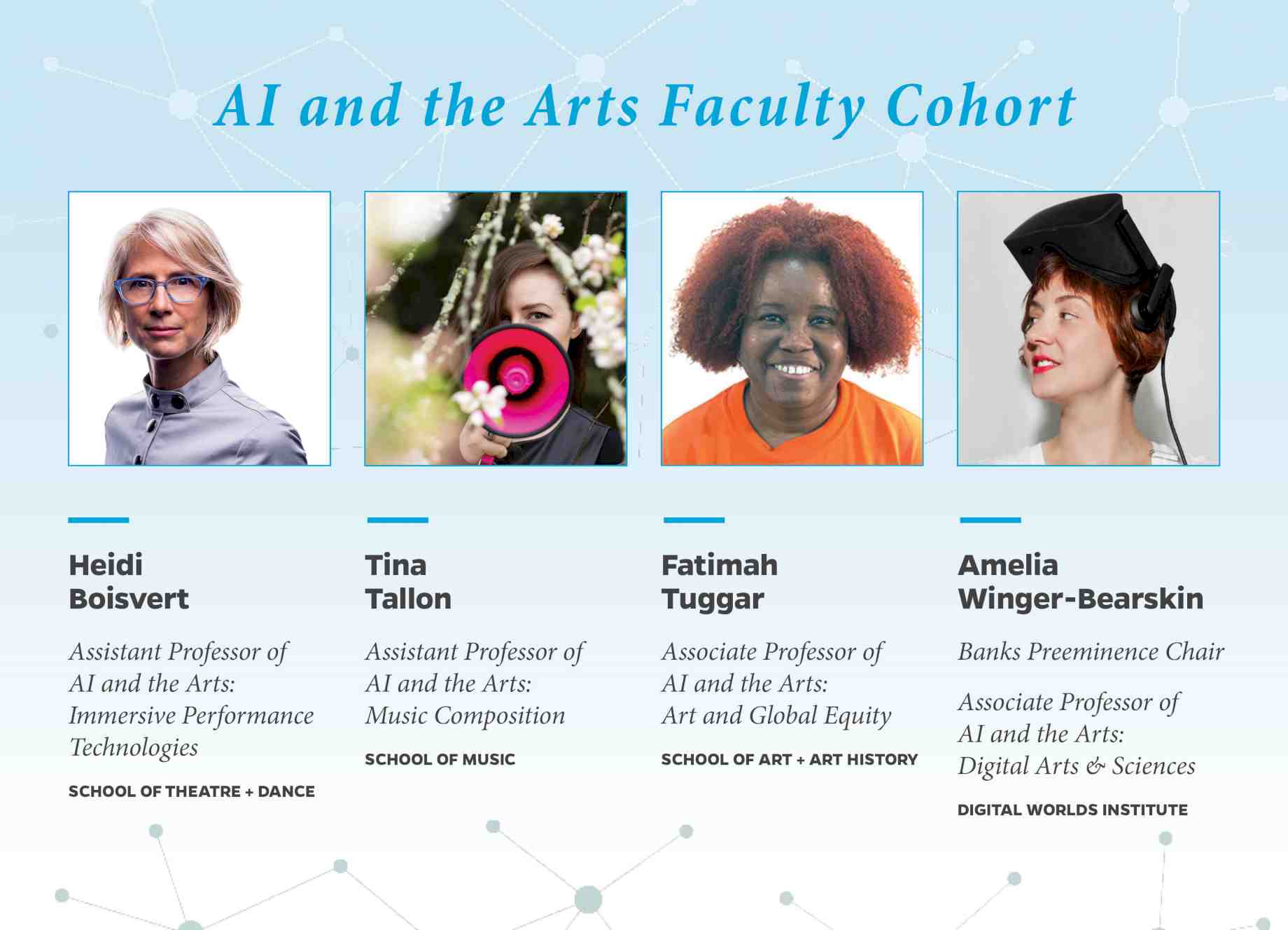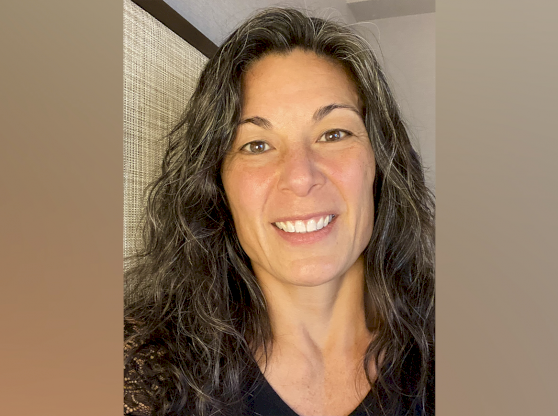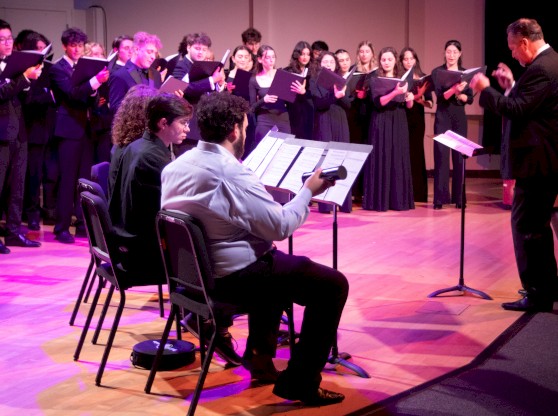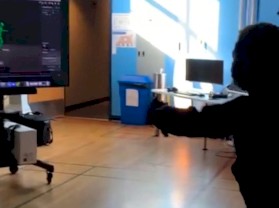Four artists and creative technologists join the University of Florida College of the Arts to lead scholarly and creative research in artificial intelligence and the arts.
After an international search process, the College of the Arts welcomes Heidi Boisvert, Tina Tallon, Fatimah Tuggar, and Amelia Winger-Bearskin to professorships in AI and the Arts this fall. The cohort represents a variety of artistic and creative disciplines, with each member appointed to a different school or institute within the college.
AI and the Arts Faculty Cohort
Heidi Boisvert
Assistant Professor of AI and the Arts: Immersive Performance Technologies
School of Theatre and Dance
Tina Tallon
Assistant Professor of AI and the Arts: Music Composition
School of Music
Fatimah Tuggar
Associate Professor of AI and the Arts: Art and Global Equity
School of Art and Art History
Amelia Winger-Bearskin
Banks Preeminence Chair
Associate Professor of AI and the Arts: Digital Arts and Sciences
Digital Worlds Institute
As a cohort, they will help shape the college’s contributions to the University of Florida’s AI initiative, according to College of the Arts Dean Onye Ozuzu.
“I see this cohort of four new members of our faculty, dispersed as they are in four distinct units of the college, as the core of a groundbreaking opportunity for the College of the Arts to lead in the context of UF’s focus on the development of artificial intelligence,” Ozuzu says.
In 2020, the University of Florida announced its initiative to become a national leader in the application of AI. Through a public-private partnership with UF alumnus Chris Malachowsky and NVIDIA, the Silicon Valley-based technology company he cofounded, the university acquired the world’s fastest AI supercomputer in higher education. The initiative included a commitment to hiring 100 faculty members focused on AI.
The College of the Arts seeks to explore how artistic practices—such as critique, improvisation, and a focus on process over product—can inform how artificial intelligence is cultivated and used and how its influence on society is designed.
“The arts allow us to examine our world and fashion possible futures,” says Amelia Winger-Bearskin, who joins the UF Digital Worlds Institute as Associate Professor of AI and the Arts: Digital Arts and Sciences. “The arts can also guide us as we imbue technology with our own ethics and values as we work together to realize the dreams of AI.”
Winger-Bearskin is also appointed as a Banks Preeminence Chair, an endowed faculty position made possible by Andrew and Pamela Banks and their family to advance teaching, research, and academic programs.
“I am excited to join the community of excellence at the University of Florida and continue innovating with artificial intelligence in ways that make a positive impact on our community and the environment,” Winger-Bearskin says.
The cohort will work to craft AI-related curricula in the College of the Arts.
Heidi Boisvert, who joins the UF School of Theatre and Dance as Assistant Professor of AI and the Arts: Immersive Performance Technologies, says she looks forward to building curriculum that reflects artists’ responsibility to advance equity and access in the context of artificial intelligence.
“As artists and creative technologists working with AI, machine learning, natural language processing, synthetic media and more, we have a responsibility to ensure that these emerging technologies become more accessible and inclusive for diverse communities, are grounded in ethics, and are implemented for societal good, not corporate profit or systems of oppression,” Boisvert says. “I am excited to co-design a curriculum that reflects these values and encourages students across the College of the Arts to become provocateurs and gadflies challenging the trajectory of future technology through critical discourse, artistic expression, open-source invention, and social impact.”
The University of Florida is among the nation’s first to integrate AI across all disciplines and make it a ubiquitous part of the academic enterprise. The university’s vision includes ensuring every UF student develops a basic competency in AI regardless of their field of study.
“I am enthusiastic about working with students on algorithmic literacy and transparency,” says Fatimah Tuggar, who joins the UF School of Art and Art History as Associate Professor of AI and the Arts: Art and Global Equity. “Positively, this will lead to students creating artworks using AI that avoid the traps of applying technological answers to aesthetic questions and grounding students in developing more empathy and contextual awareness for humanity, other life forms, and the environment.”
Researchers and artists at the College of the Arts began working on AI-related projects in recent years, including work focused on utilizing AI to classify and analyze human motion.
Associate Professor Angelos Barmpoutis and Maker in Residence Qudus Onikeku each lead projects that explore machine learning’s capacity to codify human motion and dance movements. Their projects have implications for the future of clinical and telehealth settings, orthopedic centers, choreographic practice, and cross-cultural movement analysis, which has the capacity to address racial inequities and cultural appropriation and to revolutionize intellectual property laws and the attendant economic benefits to creatives.
This past year, administrators and faculty began envisioning what the future of AI research and curriculum could look like at the College of the Arts. In January, the UF Center for Arts, Migration, and Entrepreneurship (CAME) hosted a convening with AI 4 Afrika, a cross-sectoral ‘think and do’ consortium dedicated to the inclusion of African talent and perspective in the development trajectory of artificial intelligence. In March, the college held an AI symposium, facilitated by Kamal Sinclair, Executive Director of the Guild of Future Architects, and a discussion exploring improvisation, race, and AI and their evolving influence on art and creative practice, led by Assistant Professor Richard Pellegrin.
Oṣubi Craig, the director of CAME, says these partnerships with global initiatives and a willingness and curiosity to engage have inspired new questions for faculty and staff at the college.
“Our faculty are the experts in possibility, probing with questions to focus the lens of invention towards experience that centers human beings.,” Craig says. “We are less interested in machines mimicking things we have done and more interested in exploring what we might do next. We are engaging in a global dialogue, hosting critical conversations about culture and inclusion at the level of data.”
The College of the Arts “AI and the Arts” faculty will collaborate within their artistic disciplines, across the college, and throughout the university as part of a campus-wide AI and Society cohort, which will include faculty from the Warrington College of Business, College of Education, College of Health and Human Performance, Levin College of Law, College of Liberal Arts and Sciences, the Florida Museum, and Smathers Libraries.
Tina Tallon joins the UF School of Music as Assistant Professor of AI and the Arts: Music Composition and says she looks forward to being in an interdisciplinary environment that engages multiple aspects of her professional expertise.
“I didn't fully appreciate what it meant to find one's ‘dream job’ until UF announced this initiative,” Tallon says. “Its highly interdisciplinary nature allows me to fully embrace all the different facets of my work as an artist, engineer, historian, and educator in service of society, which I’ve never found space to do anywhere else.”
Tallon adds that defining the future of AI is an opportunity to bring together important perspectives.
“Humanity is at a critical point on many fronts but especially so in terms of how we technologically mediate our future on this planet,” she says. “We need to ensure that everyone—particularly those who have previously been silenced by structural inequity—is engaged in conversations about how to design, implement, and contextualize the AI tools that increasingly influence our everyday lives. I am thrilled to have the privilege of working alongside such incredible colleagues to help shape a program that makes space for everyone to bring all of who they are to the table and to train students across disciplines to identify and innovate ways in which they can use their skills and experiences to create a more just and equitable future.”
Learn More
- Heidi Boisvert
Heidi Boisvert
Assistant Professor of AI and the Arts: Immersive Performance Technologies
School of Theatre and DanceHeidi Boisvert (Ph.D., Rensselaer Polytechnic Institute) is an interdisciplinary artist, experience designer, creative technologist, and academic researcher who interrogates the neurobiological and socio-cultural effects of media and technology. Simply put, she studies the role of the body, the senses, and emotion in human perception and social change. Boisvert is currently mapping the world's first media genome, while taking great care with its far-reaching ethical implications. She founded futurePerfect lab, a creative agency and think-tank that works with social justice organizations to design playful emerging media campaigns to transform the public imagination. She also co-founded XTH, a company creating novel modes of expression through biotechnology and the human body. Presently, she is working with David Byrne on Theater of the Mind, a new immersive theater piece. Boisvert comes to COTA from her role as the Director of Emerging Media Technology at CUNY, where she taught advanced classes in game design, virtual and augmented reality. She is also a Senior Research Fellow at the Norman Lear Center, a research affiliate in the Open Documentary Lab at MIT, and a member of NEW INC’s Creative Science track.
- Tina Tallon
Tina Tallon
Assistant Professor of AI and the Arts: Music Composition
School of MusicWinner of the 2021-2022 Frederic A. Julliard/Walter Damrosch Rome Prize in Music Composition, Tina Tallon (Ph.D., University of California San Diego) is a temporal media artist, engineer, historian, and educator whose work grapples with questions of identity, agency, and power as constructed and performed in our increasingly technologically-mediated world. During her doctoral studies, she explored the potential of electronic music as a reparative medium for engaging trauma. Tallon’s current research focuses on the myriad ways in which artificial intelligence influences how artists engage with society, with a specific emphasis on equity and algorithmic justice. Her interests include human-computer interaction, virtual tactility, embodied sonic cognition, algorithmic composition and procedural music, data sonification, computational musicology, labor, automation, intellectual property, and accessibility. Recognizing the challenges posed by lack of access to sophisticated, nuanced, and affordable documentation services for emerging and underrepresented artists, Tallon founded SALT Arts Documentation, an outfit that specializes in creating artistically-informed audiovisual documents of contemporary performing arts and training other artists in audio engineering, videography, photography, and web design. Prior to joining the faculty at the University of Florida, she served as Assistant Professor of Composition at the Boston Conservatory at Berklee, Visiting Assistant Professor of Music at Clark University, and Lecturer in Music and Theater Arts at MIT.
- Fatimah Tuggar
Fatimah Tuggar
Associate Professor of AI and the Arts: Art and Global Equity
School of Art and Art HistoryInterdisciplinary artist Fatimah Tuggar (MFA, Yale University) was born in Nigeria and raised there and in the United Kingdom. She has studied, lived, and worked in the US since the late '80s. Her work uses technology as both medium and subject to serve as metaphors for power dynamics. She combines objects, images, and sounds from diverse cultures, geographies, and histories to comment on how media and technology diversely impact local and global realities. Tuggar's work has been widely exhibited at international venues in over twenty-five countries on five continents. She has received awards and commissions, including a Guggenheim Creative Arts Fellowship, a W. A. Mellon Research Fellowship from Franklin Humanities Institute at Duke University, and a Civitella Ranieri Fellowship. Tuggar's art education covers three continents and a broader range of disciplines, traditions, processes, and materials. Her work has been the subject of various panels and articles. Her body of work has also been integrated into academic curricula in multiple disciplines and discussions, including cultural studies, feminism, diaspora, globalization, anthropology, and social and environmental justice. Tuggar has been teaching in higher education for a decade and a half. Her students have gone on to have productive careers in art and technology.
- Amelia Winger-Bearskin
Amelia Winger-Bearskin
Banks Preeminence Chair
Associate Professor of AI and the Arts: Digital Arts and Sciences
Digital Worlds InstituteAmelia Winger-Bearskin (MFA, University of Texas) is an artist who empowers people to leverage bleeding edge technology to effect positive change in the world. She is an Innovation Fellow at the Land Acknowledgement Lab for the U.S. Department of Arts and Culture: Honor Native Land Initiative. She founded the project Wampum.Codes which is both an award-winning podcast and ethical framework for software development based on indigenous values of co-creation. She continued her research in 2021 at Stanford University as their artist and technologist in residence made possible by the Stanford Visiting Artist Fund in Honor of Roberta Bowman Denning. In 2019 she was an invited presenter to His Holiness, The 14th Dalai Lama, at his world headquarters in Dharamsala for the Summit on Fostering Universal Ethics and Compassion. In 2018 she was awarded a MacArthur/Sundance Institute fellowship for her 360 video immersive installation in collaboration with the artist Wendy Red Star (supported by the Google JUMP Creator program). IDEA New Rochelle, the non-profit she founded in partnership with the New Rochelle Mayor’s Office, won the 2018 $1 Million Dollar Bloomberg Mayors Challenge for their VR/AR citizen toolkit to help the community co-design their city. In 2018 she also was awarded the 100k Alternative Realities Prize for her Virtual Reality Project from Engadget and Verizon Media. Winger-Bearskin is Haudenosaunee (Iroquois) of the Seneca-Cayuga Nation of Oklahoma, Deer Clan.
Oṣubi Craig discusses the role of the arts and AI in society.



